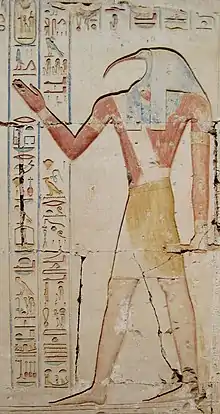Thoth
English

Thoth, relief in the temple of Ramesses II in Abydos, Egypt
Etymology
Via Latin from Ancient Greek Θώθ (Thṓth), from Egyptian ḏḥwtj (“Thoth”, literally “he who is like the ibis”)
.
Pronunciation
- IPA(key): /θəʊθ/
Audio (Southern England) (file) - Rhymes: -əʊθ
Proper noun
Thoth
- (Egyptian mythology) The ancient Egyptian moon god of wisdom, learning, and magic, usually depicted as an ibis or baboon.
- The first month of the later ancient Egyptian civil calendar and Coptic calendar, corresponding to the first month of the season of Akhet. Since 25 BCE, when the calendar was reformed to include leap-days, Thoth has been in roughly September.
- 1762, John Kennedy, A Complete System of Astronomical Chronology Unfolding the Scriptures:
- To November 1 add 7, and the ſum will ſhew, that the ſeventh day of Thoth fell, that year, upon the eighth day of November.
- 1842, Frederick Portal, “Correspondence—Swedenborg and Champollion”, in The British Magazine and Monthly Register of Religious and Ecclesiastical Information, Parochial History, and Documents Respecting the State of the Poor, Progress of Education, Etc, volume 21:
- Now the month of Thoth was the first of the Egyptian year, because this month begins a new period.
- 1989, Bernard Pyne Grenfell, Arthur Surridge Hunt, The Oxyrhynchus Papyri, volume 56:
- In that case this quadrimenstruum would be the first one of the Egyptian year, Thoth, Phaophi, Hathyr, Choeac.
Translations
Egyptian god
| |||||
This article is issued from Wiktionary. The text is licensed under Creative Commons - Attribution - Sharealike. Additional terms may apply for the media files.